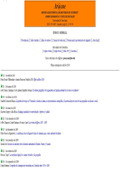Spanish University Rankings.
Abstract
In all areas of education and research has coming up the trend to elaborate rankings evaluating and comparing the quality of institutions and systems. This is accompanied, in countries like Spain, by a strategy of promoting national excellence universities so that they can compete on the concert of world universities. For such initiatives of excellence, the concept world university is essential creating a reference point for university policies introducing market principles and competition between universities and strengthening so the position of a certain type of university: the research-intensive university. Rankings and excellence initiatives, as they are currently designed, are closely linked. Both strategies are used in the power game in the university systems struggling for scientific prestige and, above all, access to resources. It is at stake a new distribution of power among scientists, departments, faculties and universities at different levels. This paper presents the results of an Internet search for rankings of Spanish universities, its methodological background and how they are framed by the excellence initiatives of the Spanish government. The comparison of the results of the different Spanish classifications focusing on universities that formed part the world university rankings highlights the great disparity between the results for the university as a whole as well as for the areas of teaching and research. Furthermore, these Spanish universities mentioned in various world rankings do not get such good results in Spanish classifications. The comparison indicates that the term world university is not so suitable to guide higher education policies. Using the term world university as a reference point, for instance, for excellence initiatives pre-conditioned the results of the respective calls giving preference to large research-intensive university. The use of rankings in the universities’ power games hides the true potential of the rankings, as a benchmarking tool to improve the functioning of universities and their own institutional profile in the case that the design reflects the complex reality of universities, faculties and departments. ---------------------------------------------------------------------------------------------------- Spanische Hochschulrankings. In allen Bildungs- und Wissenschaftsbereichen ist ein Trend zu beobachten, mit der Erstellung von Rankings die Qualität von Institutionen und Systemen vergleichend zu bewerten. In Ländern wie Spanien wird das von Exzellenz-initiativen begleitet, um einigen nationalen Hochschulen das Mitspielen im Konzert der Weltuniversitäten zu ermöglichen. Für diese Exzellenzinitiativen ist das Konzept der Weltuniversität wesentlich. Es ist ein Bezugspunkt, um marktwirtschaftliche Grundsätze einzuführen und den Wettbewerb zwischen Hochschulen zu fördern. Damit wird gleichzeitig die Stellung eines bestimmten Hochschultypus gestärkt: die forschungsintensive Universität. Rankings und die derzeitigen Exzellenz-Initiativen sind eng miteinander verbunden. Beide Strategien kommen in den Machtspielen in den Hochschulsystemen zum Einsatz. Dabei wird um wissenschaftliches Prestige und vor allem um Ressourcenzugang gekämpft. Auf dem Spiel steht eine neue Machtverteilung zwischen Wissenschaftlern, Abteilungen, Fakultäten und Universitäten auf verschiedenen Ebenen. In diesem Artikel werden die Ergebnisse einer Internetsuche zu den spanischen Universitätsrankings und ihren methodischen Hintergrund vorgestellt. Ebenso wird diskutiert, wie sie in die Exzellenz-Initiativen der spanischen Regierung eingebunden sind. Die Analyse der Ergebnisse der spanischen Universitäten, die in den Ranking der Weltuniversitäten berücksichtigt werden, zeigt die großen Unterschiede in deren Ergebnissen sowohl als Gesamtinstitution als auch in den Bereichen Lehre und Forschung. Darüber hinaus erzielen diese spanischen Universitäten in den spanischen Rankings nicht so gute Ergebnisse. Der Vergleich zeigt, dass der Begriff Weltuniversität nicht zur Lenkung der Hochschulsysteme geeignet ist. Der Begriff Weltuniversität als Bezugspunkt - zum Beispiel für Exzellenz-Initiativen - legt in gewisser Weise die Ergebnisse der jeweiligen Ausschreibungen zu Gunsten der großen forschungsintensiven Universitäten fest. Die Nutzung der Rankings an den hochschulpolitischen Machtspielen verdeckt deren wahres Potenzial als Benchmarkinginstrument zur Verbesserung universitärer Abläufe und der institutionellen Profile, aber nur dann wenn sein Design die komplexe Realität der Universitäten, der Fakultäten und der Abteilungen widerspiegelt.Downloads
Downloads
Published
Issue
Section
License
The authors who publish in this journal agree to the following terms:
a. The authors retain the authorship rights and grant the journal the right of first publication, with the work simultaneously available under a Licéncia de Creative Commons Atribución-No Comercial 4.0 Internacional (CC BY-NC 4.0) that allows the work to be shared with third parties, as long as they acknowledge the authorship and the initial publication in this magazine.
b. Authors are free to make additional independent contractual arrangements for the non-exclusive distribution of the version of the work published in the journal (such as publication in an institutional repository or in a book), provided that the initial publication in this journal is acknowledged. magazine.


